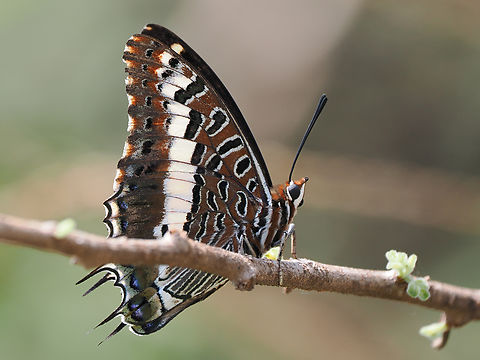
Appearance
"Ch. hansali" Fldr. closely approaches "Charaxes pelias" in the markings, but has a broad light yellow discal band extending to the inner margin of the hindwing and the basal part of the upper surface is darker black-brown; the distal yellow spots in cellules 3—7 of the forewing are small and completely separated from the band; the yellow spots at the distal margin of the hindwing are streak-like and completely separated from the distal margin by the thick black marginal line; the tails are longer than in "pelias"; the light-bordered spots in the basal part of the under surface have grey centres, as in "pelias". Abyssinia and the adjacent parts ofSomaliland. — "baringana" Rothsch. only differs from the type-form in the narrower discal band of the upper surface and the free red-brown spots at the distal side of the median band on the hindwing beneath. At Lake Baringo in British East Africa.
Naming
*"C. h. hansali"⤷ "C. h. arabica" Riley, 1931
⤷ "C. h. baringana" Rothschild, 1905
⤷ "C. h. kulalae" van Someren, 1975
⤷ "C. h. yemeni" Turlin, 1998 Historical attempts to assemble a cluster of presumably related species into a ""Charaxes jasius" Group" have not been wholly convincing. More recent taxonomic revision, corroborated by phylogenetic research, allow a more rational grouping congruent with cladistic relationships. Within a well-populated clade of 27 related species sharing a common ancestor approximately 16 mya during the Miocene, 26 are now considered together as The "jasius" Group. One of the two lineages forms a robust clade of seven species sharing a common ancestor approximately 2-3 mya, i.e. during the Pliocene, and are considered as the "jasius" subgroup.
The "jasius" Group
Clade 1: "jasius" subgroup :
⤷ "Charaxes jasius"
⤷ "Charaxes epijasius" [stat.rev.2005]
⤷ "Charaxes legeri"
⤷ "Charaxes saturnus" [stat.rev.2005]
⤷ "Charaxes pelias"
⤷ "Charaxes castor"
⤷ "Charaxes hansali"
Clade 2: contains the well-populated three additional subgroups of the jasius Group, called the "brutus", "pollux", and "eudoxus" subgroups. Further exploration of the phylogenetic relationships amongst existing "Charaxes" taxa is required to improve clarity.
Behavior
The habitat consists of arid savanna.The larvae feed on "Salvadora persica", "Osyris lanceolata", "Colpoon compressum"; and "Dobera glabra".Notes on the biology of "hansali" are provided by
References:
Some text fragments are auto parsed from Wikipedia.